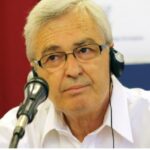Moldova and the EU signed just a few days ago the EU-Moldova Association Agreement, that includes the Deep and Comprehensive Free Trade Area (DCFTA). With this agreement, both parts develop an increasingly close relationship going beyond co-operation, to gradual economic integration and a deepening of political co-operation. A Club de Madrid High Level Mission to Moldova (April 14-16) led by Members Alexander Kwaśniewski (former President of Poland 1995-2005), Rexhep Meidani (former President of Albania 1997-2002) and Boris Tadic (former President of Serbia 2004-2012) discussed with different interlocutors the opportunities and challenges of the DCFTA agreement, amidst the Moldovan government’s negotiations with the EU, and endorsed the government’s efforts to accelerate the process of integration.
This High Level Mission was held in cooperation with the East-Europe Foundation (EEF) within the framework of the EU funded project INSPIRED (Integrated Support Programme for Inclusive Reform and Democratic Dialogue) which is implemented by a consortium of civil society organisations under the leadership of the European Partnership for Democracy (EPD).
Following meetings with Moldovan President Nicolae Timofti; Speaker of the Parliament Igor Corman; Prime Minister Lurie Leanca; leaders of political parties from the Pro European Coalition and the leaders of the Party of Communists, as well as representatives of Civil Society Organizations, CdM Members encouraged the Moldovan authorities to implement the political measures needed to combat corruption, to include civil society in political dialogue and particularly the design of the road map towards an accelerated EU accession and openly communicate to the citizens that the challenges and opportunities of the EU integration process would create the conditions for a positive impact on the country’s development, prosperity and stability.
The current geopolitical context and the worrisome developments in its neighboring country, Ukraine, made the mission all the more timely in terms of Moldova’s EU integration process and highlighted the need and urgency for reform initiatives to be undertaken by the Moldovan government.
In this recent crisis of political instability the three former Presidents underlined the importance of the Moldovan government’s commitment to deliver, efficiently and promptly, a package of policies that would bring Moldovan society closer to EU standards and will create the conditions for a long-term positive impact on the living standards of the Moldovan people, particularly those living in rural areas; to secure the sovereignty of the country and its borders; and to foster the reform of the judicial system and the eradication of corruption at all levels. The Club de Madrid delegation strongly recommends the implementation of a well-designed Deep and Comprehensive Free Trade Area roadmap in a participatory and inclusive process, including broad stakeholder consultations at the regional and national level and an inclusive dialogue with ethnic and linguistic minorities. This process would convey a positive message to both rural and urban sectors of the Moldovan society and facilitate consensus amongst the different interlocutors in order to achieve both fruitful collaboration with the EU and sustainable commercial, social and political relations with the Russian Federation.
The CdM delegation stressed the urgency of general consensus that would allow for unity of actions amongst all political parties and the need to work in the same direction. Delivering a consistent messages regarding EU integration together with civil society, the business community, trade unions and farmer’s associations is pivotal for the success of the reform process and therefore, for the future of the country. In order to further democratic values and good governance the CdM Members of the delegation reiterated their commitment to assist Moldova in tackling the challenges of reform by sharing their experience and knowledge both in democratic transition and in EU cooperation and integration.
Recommendations to the EU
The Club de Madrid delegation expressed its support for the EU-Moldova Association Agreement that includes DCFTA. The delegation emphasized the importance of continued EU support to the reform process and of facilitating Moldova’s access to the common European structures. The EU needs to strengthen its political and economic presence, particularly in the rural areas and regions populated by ethnic minorities; provide technical support and political advice when requested; present a clear perspective and strategy for Moldova to become a EU member state; and encourage the dialogue and participation of multiple stakeholder groups and political parties to unite and facilitate reform processes in accordance with EU requirements.



